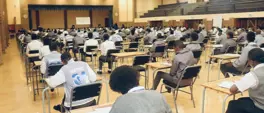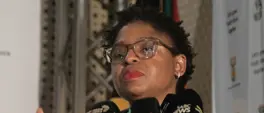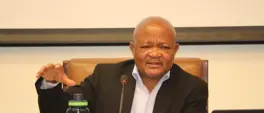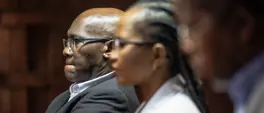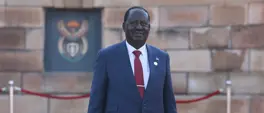MANDY WIENER: Which party won the GNU games?
Kabous Le Roux
5 July 2024 | 5:06Smaller parties are smiling, and so is Gauteng Premier Panyaza Lesufi, for now.
We’re a competitive bunch here in South Africa. We like to win World Cups - although we don’t always get it right across all the sporting codes.
We do like to produce champions. Winners of reality shows become celebrities and our politicians like to celebrate award winners.
So, forgive us for oversimplifying and falling back on the binary when it comes to politics too.
Who won the GNU games? After four weeks of gruelling tactical warfare and strategy, who emerged with the trophy?
It’s oversimplistic to say there is a clear winner although those partisan to particular parties will be quick to claim victory. It’s simply too early to say and we require the passage of time to get a true appreciation. But indulge the analogy.
The morning after the announcement of the Cabinet by President Cyril Ramaphosa, I asked Democratic Alliance leader and newly minted Agriculture Minister John Steenhuisen how he reflected on the deal the DA emerged with.
“Well, I think like any deal we are pleased where we ended up. Did we get everything we wanted? No. But did the other side get everything they wanted? No. I suppose that’s a good measure of good negotiation. We started wanting nine. The ANC started offering three. We’ve ended up with six. And I’m very pleased with that. I’m also very pleased with the gravity of portfolios. These are serious portfolios that will enable the DA to play a very positive role in helping to rescue the country and to rebuild it going forward and I’m very pleased with that,” said Steenhuisen.
The DA’s Helen Zille had intimated that the party thought it had been undersold. They knew how many cabinet positions they would be getting but they didn’t realise how inflated the cabinet would be and how that would water down its representation.
The ANC has emerged with the positions of President, Deputy President, Speaker of the National Assembly and representatives in every single ministerial portfolio, whether as a Minister or Deputy. Many would argue that’s a win considering the party only received 40% of the vote nationally.
But the reality is a real win for the ANC would have been an outright majority and not having to initiate a Government of National Unity at all. We can’t underestimate the extent of what a GNU and a coalition with the DA means to some quarters within the ANC. It riles them to have to pursue this avenue because it is seen as a return to a time reminiscent of apartheid.
The determination of who emerged with a better deal is also informed by each party’s understanding of the Statement of Intent signed between them last month. With each passing week, the DA’s confidence in the security of the deal is being eroded by the ANC as it chips away at its interpretation.
There is also an argument to be made that other parties in the GNU, aside from the ANC and DA, may have walked away with a better deal.
The IFP now holds the Premiership of KwaZulu Natal, the Minister of COGTA, the Deputy Minister of Transport and representation on the Gauteng executive. That’s a pretty good haul.
The NFP got a cracker of a deal considering it has an MEC in KZN with just one seat in the legislature. Similarly, Rise Mzanzi also got an MEC in Gauteng with just one seat in the provincial legislature.
Gayton MacKenzie emerging as Minister of Sport, Arts and Culture is also something of a coup for the Patriotic Alliance. The PAC and FF+ will also be chuffed with its ministerial positions.
But that’s the appeal of a GNU, where every participating party gets a seat at the table and the opportunity to not only benefit from the position but also contribute tangibly.
The MK can also lay claim to success as they take on the mantle of official opposition. The EFF is also finding a way to position itself as vocal opposition leaders.
If we are going to be over-simplistic and declare winners when it comes to deals and who got what, then you’ve got to hand it to Gauteng Premier Panyaza Lesufi.
He played hardball and ran away with it all.
As elections analyst Wayne Sussman pointed out, it’s a remarkable outcome.
“I have looked at coalition makeups for some time. I have never seen a party that finished first with less than 40% of the vote do so well in a coalition negotiation. The ANC in Gauteng have 35% of the vote but 73% of the cabinet seats. Remarkable outcome for Premier Lesufi,” tweeted Sussman.
This will no doubt by a pyrrhic victory for Lesufi and the Gauteng ANC. Without a majority coalition and only 32 of the 80 seats in the legislature, they will struggle relentlessly to get budgets passed and will no doubt face endless motions of no confidence.
Analyst Mbekezeli Benjamin also made the point that both President Cyril Ramaphosa and Gauteng Premier Panyaza Lesufi allocated the serious departments with big budgets to cadres and handed the minority parties stripped-down departments.
“The ANC in Gauteng won 35% of the vote and, based on the GNU agreement: - got the premier elected - got 73% of all MEC positions - who control over 98% of the provincial budget. The PA and RISE each control a split dept (Agric & Enviro) and makes up less than 1% of the budget,” he posted on X.
We can extend this analogy even further. There are fewer women in Parliament than in the last administration, so no wins for gender equality. But lots of young people are in Cabinet, so a victory for a generational mix.
Although we like to declare victors and losers and it's human instinct to do so, we simply can’t say at this stage who won the GNU games.
The ultimate winner we had always hoped would be the electorate and the people of South Africa. If a GNU means more accountability, better service delivery, an improved economy and quality of life for citizens, then we all win.
Also, Democracy won. We have had a peaceful, successful transition from one administration to the next and that is a victory worth celebrating.
Get the whole picture 💡
Take a look at the topic timeline for all related articles.
Trending News
More in Politics

16 October 2025 09:01
LIVE | Day 7: Parliamentary ad hoc committee investigating allegations of police corruption inquiry

16 October 2025 07:28
ANC's Chiloane praises stability of Gauteng's multiparty coalition govt

16 October 2025 06:21
Suspended RAF official lifts lid on culture of fear under former CEO Letsoalo
